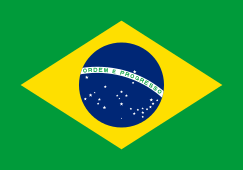There is a good range of large cap, mid cap and small cap Brazil ADRs trading on major US stock exchanges as well as on the OTC market. These Brazilian ADRs represent most sectors of the economy with a heavy emphasis on the utility, mining and natural resource sectors in particular.
Large cap Ambev SA (NYSE: ABEV) would be the most familiar Brazilian stock to American investors as its a subsidiary of Interbrew International BV which controls Anheuser Busch Inbev NV (NYSE: BUD) which in turn is effectively managed by the Brazilians. Embraer SA (NYSE: ERJ) is also a familiar Brazilian stock as its the maker of smaller commercial airliner and business jets.
In addition, Restaurant Brands International (NYSE: QSR), which owns Burger King, Popeyes Louisiana Kitchen and Canadian coffee shop and restaurant chain Tim Hortons, is controlled by Brazil based global investment group 3G Capital who, along with Berkshire Hathaway (NYSE: BRK.A), backed the merger of Kraft Foods Group and Heinz into Kraft Heinz Co (NASDAQ: KHC) which they both jointly control.
Small cap Fogo De Chao Inc (NASDAQ: FOGO) was a publicly listed US-based holding company operating upscale Brazilian churrascaria steakhouses that began in Brazil (where it still has operations) and is now headquartered in Texas with most restaurants being in the USA. The entire company was acquired in 2018 by Rhône Group (a private equity group), but there were indications in 2021 that it may go public again.
However, no discussion of investing in Brazilian ADRs and stocks is complete without mentioning Operation Car Wash (Operação Lava Jato). Originally a money laundering investigation, it expanded to cover allegations of corruption at Petrobras (NYSE: PBR), where executives allegedly accepted bribes in return for awarding contracts to construction firms at inflated prices (this criminal scheme was initially known as Petrolão or “big oil” because of the Petrobras scandal). After Brazilian construction company Odebrecht was deeply implicated, at least eleven other (mostly Latin America) countries became involved with now delisted diversified Peruvian conglomerate Grana y Montero SAA (NYSE: GRAM) being among other Latin American stocks tainted by the scandal.
Investors interested in other ways to invest in Brazil should also check out our Brazil ETFs list, Latin America Closed-End Funds list and Latin America ETF list (region wide) pages.
Note: Stocks delisted from the OTC (whether due to mergers, acquisitions or for other reasons) have been left in the table (as their websites still provide a good feel for the company and the local market) and may still trade on local, regional or European (e.g. London) stock exchanges. They may also be holdings of country or region specific ETFs, closed-end funds or Indices.
List of Brazil ADRs Trading on Major US Stock Exchanges & the Over-the-Counter (OTC) Exchange
* EmergingMarketSkeptic.com provides useful information that should not constitute investment advice or a recommendation to invest. In addition, your use of any content is entirely at your own risk and it is your sole responsibility to evaluate the accuracy, completeness and usefulness of the content. Read More
Note: If there are any ADRs to add or remove from this list or there are bad links, please write a note in the comments section so it can be fixed. Likewise, adding any other comments or advice would also be appreciated.
Brazil Stocks Often Have Dual-Class Share Structures
Before investing in Brazilian stocks or Brazil ADRs, its worth reading a CFA Society article and paper entitled: “An Assessment of Dual-Class Shares in Brazil.” This paper explains how Brazilian stocks typically have “preferred” shares available to the public with no voting rights (but compensated with a slightly higher dividend) and “common” shares held by founders and insiders that has voting rights. In other words and like many tech or private equity controlled stocks, Brazilian stocks tend to be “closely held” companies controlled by families or a small group of insiders.
Brazil Stock Exchanges
With origins dating back to 1890, the B3 S.A. – Brasil, Bolsa, Balcão (“B3 – Brazil Stock Exchange and Over-the-Counter Market”), formerly BM&F BOVESPA, was created in 2008 when the Brazilian Mercantile and Futures Exchange (BM&F) and the São Paulo Stock Exchange (Bovespa) merged. Its now one of the largest stock exchanges in the world in terms of market capitalization, the second largest stock exchange in the Western hemisphere and the biggest stock exchange in Latin America. Chicago’s CME Group also owns a 5% stake in the BS (who also owns a 5% stake in the CME Group).
Brazil’s second largest stock exchange is the Bolsa de Valores de Rio de Janeiro (BVRJ) which was founded in 1820, sold to BM&F in 2002 and now trades government bonds and currencies.
In addition, the Bolsa de Cereais e Mercadorias de Maringá (BCMM) was founded in 1982 and concentrates on the marketing of agricultural products nationwide.
Brazil Stocks and Investing Resources
Here are some useful and mostly English news resources for investing in Brazilian ADRs or stocks or about Brazil in general:
- América Economía (Brazil)
- Brazil Charlab (Twitter)
- Brazil Sun
- Correio Braziliense
- Diário Oficial da União
- Época
- ES Brasil
- Estado de Minas
- Exame Invest
- Folha de S. Paulo
- ISTOÉ
- Jornal do Brasil (JB)
- Jornal do Comércio
- Jornal do Commercio
- MercoPress (Mercosur bloc)
- O Dia
- O Estado de S. Paulo
- O Globo
- Pipeline (Valor Econômico)
- The Rio Times
- Valor Econômico
- Veja
For additional resources for investing in Brazil ADRs or stocks, check out all of our Brazil tagged articles/links.
